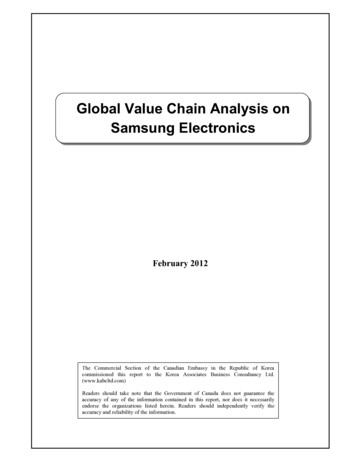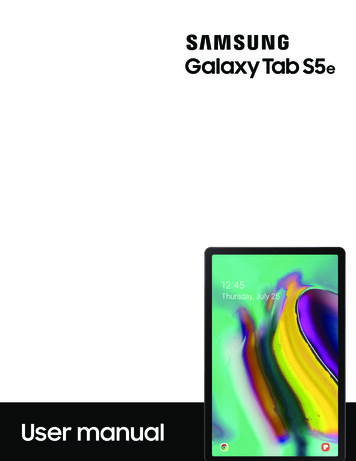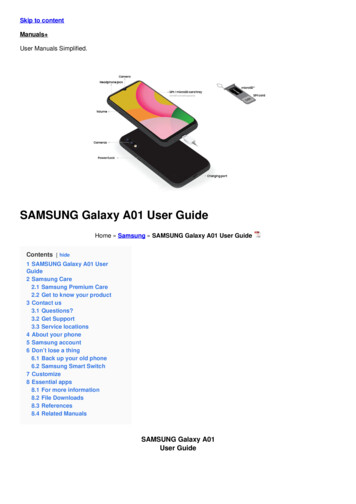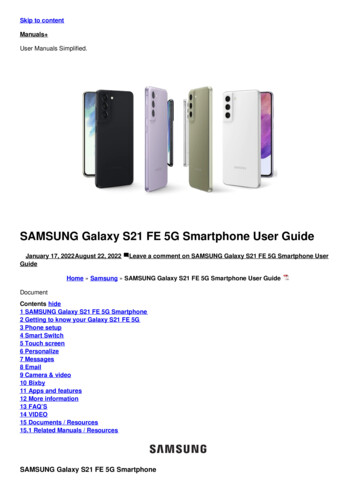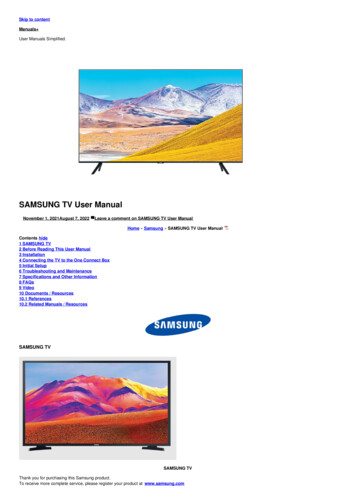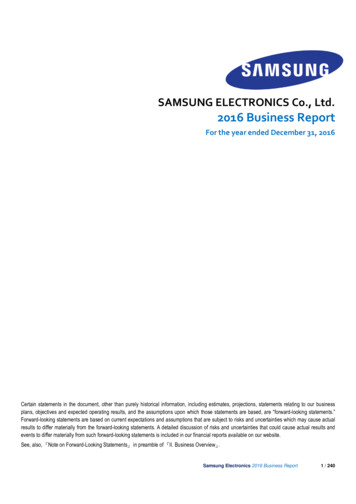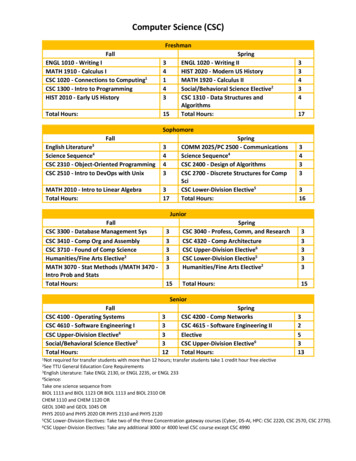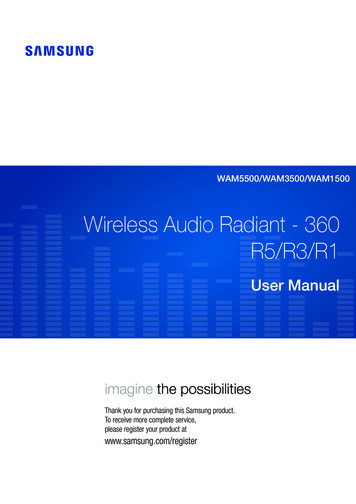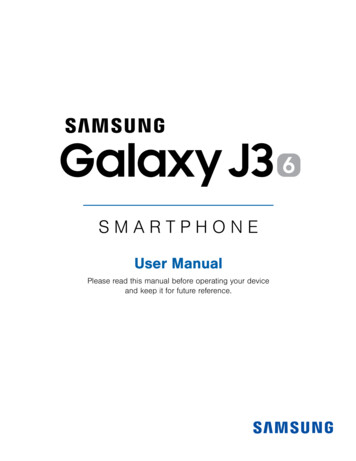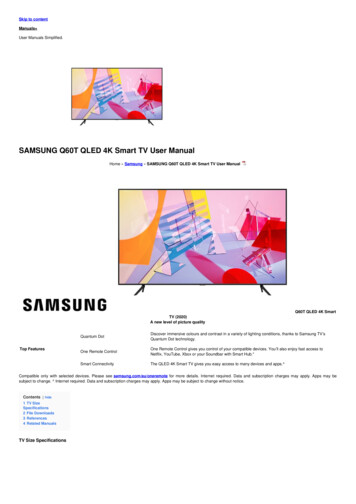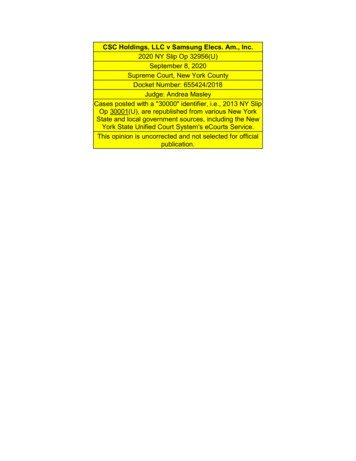
Transcription
CSC Holdings, LLC v Samsung Elecs. Am., Inc.2020 NY Slip Op 32956(U)September 8, 2020Supreme Court, New York CountyDocket Number: 655424/2018Judge: Andrea MasleyCases posted with a "30000" identifier, i.e., 2013 NY SlipOp 30001(U), are republished from various New YorkState and local government sources, including the NewYork State Unified Court System's eCourts Service.This opinion is uncorrected and not selected for officialpublication.
[*FILED:1]NEW YORK COUNTY CLERK 09/08/2020 04:11 PMNYSCEF DOC. NO. 70INDEX NO. 655424/2018RECEIVED NYSCEF: 09/08/2020SUPREME COURT OF THE STATE OF NEW YORKCOUNTY OF NEW YORK: COMMERCIAL DIVISION PART ------------------------------XCSC HOLDINGS, LLC.,INDEX NO.655424/2018Plaintiff,MOTION DATE-vSAMSUNG ELECTRONICS AMERICA, INC.,MOTION SEQ. NO.002DECISION ORDER N. ANDREA MASLEY:The following e-filed documents, listed by NYSCEF document number (Motion 002) 23, 30, 33, 63, 65,66, 67, 68,DISMISSwere read on this motion to/forIn motion sequence number 002, defendant Samsung Electronics America, Inc.(Samsung) moves, pursuant to CPLR 3211, to dismiss the complaint filed by plaintiff CSCHoldings, LLC (CSC).BackgroundThe following facts are alleged in the complaint unless noted otherwise, and forpurposes of this motion, accepted as true.CSC entered into an agreement with Samsung on January 15, 2010 (Agreement).(NYSCEF Doc. No. [NYSCEF] 21, Complaint 1f 12.) Pursuant to the Agreement, Samsuhgpromised to sell, license or provide CSC "Hardware" and "Software", collectively referred toas "Products". (NYSCEF 21, ex 1, Agreement§ 1 [a], [b].) CSC in tum promised topurchase, license, accept and pay for the Products. (Id.§ 1.) CSC alleges that the"Products" refer to Set-Top boxes such as the SMT-C5320. (NYSCEF 21, Complaint 1f 2.)Under the Agreement, Samsung promised to indemnify CSC if any claim is broughtagainst CSC "alleging that the manufacture, use or sale of the Samsung products, or u r,65542412016 CSC HOLDINGS LLC AND ELAN CANON vs. SAMSUNG ELECTRONICS AMERICA INC.Motion No. 002Page 1 of 141 of 14
[*FILED:2]NEW YORK COUNTY CLERK 09/08/2020 04:11 PMNYSCEF DOC. NO. 70INDEX NO. 655424/2018RECEIVED NYSCEF: 09/08/2020of associated software licensed by Samsung to [CSC], infringes any patent." (Id.fl 3;NYSCEF 21, ex 1, Agreement§ 19.) Samsung also promised to procure and pay royalties\for all intellectual property rights "associated with the manufacture and use of the Set Topincluding, but not limited to MPEG 4, 1394, OCAP, Alticast middleware and NOS JCAS."(NYSCEF 21, ex 1, Agreement, ex A§ 2; NYSCEF 21, Complaint W 4, 40.) Samsungfurther promised to procure and pay "all Samsung supplied head end equipment."(NYSCEF 21, Agreement, ex A§ 2.)On September 8, 2015, nonparty TiVo Corporation (TiVo) commenced an actionagainst Samsung alleging that Samsung's Set-Top boxes infringe TiVo's patents.(NYSCEF 21, Complaint 1T 42.) Subsequently, TiVo and Samsung entered into aconfidential Patent License Agreement (TiVo-Samsung License). (/d.f! 44.)TiVoannounced that both parties "agreed to terms regarding a broad intellectual propertylicense that will provide certain rights under TiVo's patent portfolios for Samsung's leadingmobile, consumer electronic and set-top box businesses." (/d.f! 45.)CSC alleges thatSamsung carved out from the scope of the TiVo-Samsung License Set-Top boxes thatSamsung provided to CSC. (Id.fl 47.)In 2017, TiVo "made a claim against [CSC] alleging that certain Samsung Products,Including without limitation the use of the Samsung SMT-C5420 set-top box in [CSC's]Remote Storage DVR (RS-DVR) network and/or with a USB live-TV 'Rewind Buffer,'infringes certain of TiVo's United States patents." (/d.1f 5.) TiVo allegedly representedtoCSC's parent corporation that "[w]hile we [TiVo] previously concluded an agreement withSamsung, as we recently informed your team, the Samsung set-top boxes deployed in the[CSC] Optimum services are not licensed under that agreement. This exclusion ofSamsung set-top boxes deployed in the [CSC] Optimum service has also been confirmedby Samsung." (/d.f! 48.)655424/2016 CSC HOLDINGS UC AND ELAN DANON vs. SAMSUNG ELECTRONICS AMERICA INC.Motion No. 002Page 2 of 142 of 14
[*FILED:3]NEW YORK COUNTY CLERK 09/08/2020 04:11 PMNYSCEF DOC. NO. 70INDEX NO. 655424/2018RECEIVED NYSCEF: 09/08/2020CSC provided Samsung with a formal written notice of TiVo's claims, requested thatSamsung indemnify CSC, and gave Samsung the right to defend or settle the claim withcounsel of Samsung's choice. (Id.not warranted." (Id.,-r 56.),-r,-r 50-54.)Samsung responded that "indemnification isSamsung asserted that "the 'Rewind Buffer' referenced inTiVo's presentation is not a part of a Samsung set-top box as sold to [CSC] ('SamsungProducts')." (Id.,-r 57.)Samsung also asserted that "[m]odification of such boxes and/or 5combination with software and other products so as to include a 'Rewind Buffer' fall with1i\'4ltexception clauses . thus confirming Samsung has no indemnification obligations as to theTiVo matter." (Id. 57.)"Unable to gain the benefit of Samsung's contractual obligations," CSC alleges thatit "resolved TiVo's [c]laims against it by entering into an agreement with TiVo." (Id.1r 94.)CSC subsequently commenced this action against Samsung alleging breaches of theAgreement and a breach of the implied covenant of good faith and fair dealing.CSC alleges that TiVo's patent infringement claim against it was not based on a .modification to the Samsung products made by CSC without the written consent ofSamsung or other circumstances that would trigger the exception clauses to Samsung's\indemnification obligations. (/d.1f 92.)'iCSC states that its "RS-DVR network and USB live-TV 'Rewind Buffer' are madeavailable on the Samsung SMT-C5320 [S]et-[T]op boxes for use by [CSC's] cabletelevision service subscribers." (Id1r 6.)CSC insists that it "did not modify the Samsung·Products in any way beyond the Samsung Products' intended uses known and approvedby Samsung." (/d.1f 58.) Apparently, "[i]n a March 19, 2010 email, [CSC] requested fromSamsung prototype SMT-C5320 [S]et-[T]op boxes (Samsung Products include SMTC5320 set-top boxes) that had a single tuner DVR that would be used in [CSC's] soon to:.be deployed RS-DVR environment (an external, cloud-hosted hard drive DVR65 2412016 CSC HOLDINGS LLC AND ELAN DANON vs. SAMSUNG ELECTRONICS AMERICA INC.Page 3of14Motion No. 0023 of 14
[*FILED:4]NEW YORK COUNTY CLERK 09/08/2020 04:11 PMNYSCEF DOC. NO. 70INDEX NO. 655424/2018RECEIVED NYSCEF: 09/08/2020environment), with a small, internally mounted solid state hard drive to be used for localpause/live buffer (e.g., Rewind Buffer)." (/d.1f 70.) CSC requested that the Set-Top box"have either an external or internal solid state hard drive flash memory for the RewindBuffer functionality." (Id. [emphasis in original].) Allegedly, "Samsung responded with awritten slide-deck proposal and request for approval of a purchase order to commencedevelopment of an SMT-C5320 [S]et-[T]op box having an externalUSB connected harddrive." (/d.1f 71 [emphasis in original].) CSC confirmed in writing Samsung's proposal.(Id 1f 72.)Allegedly, "Samsung worked with [CSC] to implement and deploy the SamsungProducts for use in the [CSC] RS-DVR network." (Id1f 77 .)"Samsung worked directlyWith [CSC] to identify and develop USS hard drives that would support the Rewind Bufferfunctionality on the Samsung Products. Such efforts are memorialized through written,correspondence between [CSC] and Samsung." (/d.1f 80.) Subsequently, CSC andSamsung allegedly worked together to implement the "porting of an updated softwareplatform back into the currently existing Samsung SMT-C5320 set-top box hardwareprovided by Samsung to [CSC]." (/d.1f 83.) This software allegedly included "the softwareplatform to deploy the Rewind Buffer functionality that Samsung first demonstrated to[CSC] in 2011." (Id 1f 84.)In short, CSC alleges that "Samsung developed and implemented for [CSC] thesoftware and hardware identified in TiVo's [c]laim, knowing that the software and hardwarewould be deployed for use in [CSC's] RS-DVR network and with the Rewind Buffertechnology." (/d.1f 91.)DiscussionOn a motion to dismiss pursuant to CPLR 3211 (a) (7), the court must "accept thefacts as alleged in the complaint as true, accord plaintiffs the benefit of every possible65542412016 CSC HOLDINGS LLC AND ELAN DANON vs. SAMSUNG ELECTRONICS AMERICA INC.Page 4 of 14Motion No. 0024 of 14
[*FILED:5]NEW YORK COUNTY CLERK 09/08/2020 04:11 PMNYSCEF DOC. NO. 70INDEX NO. 655424/2018RECEIVED NYSCEF: 09/08/2020favorable inference, and determine only whether the facts as alleged fit within anycognizable legal theory." (Leon v Martinez, 84 NY2d 83, 87-88 [1994].) However, factualallegations "that consist of bare legal conclusions, as well as factual claims which areeither inherently incredible or flatly contradicted by documentary evidence" cannot survivea motion to dismiss. (Summit Solomon & Feldesman v Lacher, 212 AD2d 487, 487 [1stDept 1995] [citation omitted]; see also CPLR 3211 [a] [1].)A. Breach of Contract"The elements of a breach of contract claim are formation of a contract between theparties, performance by the plaintiff, the defendant's failure to perform, and resultingdamage." (Flomenbaum v New York Univ., 71 AD3d 80, 91 [1st Dept 2009].) CSCsufficiently alleges the first and second elements. (NYSCEF 21, Complaint 4ml100 28, 12[parties entered into an enforceable agreement on January 15, 2010]; idml 101, 31, 37,52, 54 [CSC performed all the conditions, covenants, and promises required by theAgreement, including purchasing and licensing the Hardware and Software and providingformal notice to Samsung of TiVo's patent infringement claims, a request that Samsungindemnify it, and permission to defend or settle the claim at Samsung's expense withSamsung's counsel of choice].)To satisfy the third element, CSC alleges two separate breaches.1. The First Breach: Failure to IndemnifyCSC alleges that Samsung breached the Agreement by failing to indemnify anddefend CSC from a patent infringement suit commenced by nonparty TiVo. (Id. 104.)The relevant provision of the Agreement states,"[i]f any claim, suit, action or proceeding is brought against [CSCJ(or any of its officers, directors, subsidiaries, affiliates,subcontractors, customers and employees) (collectively"(Indemnified Parties") [sic] alleging that the manufacture,use or sale of the Samsung products, or use of associatedsoftware licensed by Samsung to [CSC], infringes any655424/2016 CSC HOLDINGS LLC AND ELAN DANON vs. SAMSUNG ELECTRONICS AMERICA INC.Motion No. 002Page 5 of 145 of 14
[*FILED:6]NEW YORK COUNTY CLERK 09/08/2020 04:11 PMNYSCEF DOC. NO. 70INDEX NO. 655424/2018RECEIVED NYSCEF: 09/08/2020patent . Samsung shall indemnify, defend and holdharmless such Indemnified Parties from and against allcosts, liabilities, expense and actual increased andstatutory damage"(NYSCEF 21, ex 1, Agreement§ 19.) CSC then alleges that "[i]n 2017, third party TiVomade a claim against [CSC] alleging that certain Samsung Products, including withoutlimitation the use of the Samsung SMT-C5320 set-top box in [CSC's] Remote StorageDVR (RS-DVR) network and/or a USB live-TV 'Rewind Buffer,' infringes certain of TiVo'sUnited States patents." (NYSCEF 21, Complaint,-[ 5.) Nevertheless, "Samsung refused[CSC's] tender of TiVo's Claim and refuse[d] to honor its indemnification . obligations thatarose at the time of TiVo's Claims. (Id.,-[ 8.)CSC argues that it states a claim because the undefined term "Samsung products"encompasses Samsung's SMT-C5420 Set-Top box although CSC alternatively posits thatthe term "Samsung products" is ambiguous. Samsung argues that a breach is not statedibecause neither the Rewind Buffer nor the RS-DVR network is included in the features andspecifications listed in the Agreement's Attachment A; thus, "Samsung products" refersonly to the products actually provided by Samsung, as defined in the Agreement'sAttachment A. It is the use of these products i.e. SMT-C5420 alone that must cause the infringement, according to Samsung, otherwise it does not have an obligation to inderrfrrifo/."[A] contract should be read as a whole, and every part will be interpreted withreference to the whole; and if possible it will be so interpreted as to give effect to itsgeneral purpose." (Matter of Westmoreland Coal Co. v Entech, Inc., 100 NY2d 352, 358[2003] [internal quotation marks and citation omitted].) "Thus, a written agreement that iscomplete, clear and unambiguous on its face must be enforced according to the plainmeaning of its terms." (Greenfield v Phil/es Records, 98 NY2d 562, 569 [2002] [citatiofts'IYomitted].) "A contract is unambiguous if the language it uses has a definite and precisemeaning, unattended by danger of misconception in the purport of the [agreement] itself,65 24/2016 CSC HOLDINGS LLC AND ELAN DANON vs. SAMSUNG ELECTRONICS AMERICA INC.Motton No. 002Page 6of146 of 14
[*FILED:7]NEW YORK COUNTY CLERK 09/08/2020 04:11 PMNYSCEF DOC. NO. 70INDEX NO. 655424/2018RECEIVED NYSCEF: 09/08/2020and concerning which there is no reasonable basis for a difference of opinion." (Id[internal quotation marks and citation omitted].) "A contract is ambiguous if 'on its face [it]is reasonably susceptible of more than one interpretation."' ( Telerep, LLC v U.S.lntl.Media, LLC, 74 AD3d 401, 402 [1st Dept 2010] [citation omitted].) The test for ambiguity isto examine the four corners of the document, not outside sources. ( W W. W Assocs. vGiancontieri, 77NY2d 157, 162 [1990].)The court should review 'the entire contract and consider the relation of the partiesand the circumstances under which it was executed. Particular words should beconsidered, not as if isolated from the context, but in the light of the obligation as a wholeand the intention of the parties as manifested thereby. Form should not prevail over ' substance and a sensible meaning of words should be sought." (Kass v Kass, 91 NY2tl554, 566 [1998] [internal quotation and citation omitted].) "[E]xtrinsic and parol evidence isnot admissible to create ambiguity in a written agreement which is complete and clear andunambiguous upon its face." (Intercontinental Planning v Daystrom, Inc., 24 NY2d 372,379 [1969] [citations omitted].) "If the court concludes that a contract is ambiguous, itcannot be construed as a matter of law, and dismissal under CPLR 3211 (a) (7) is notappropriate." ( Telerep, LLC, 74 AD3d at 402 [citation omitted].)Here, the Agreement provides that Samsung will sell, license or provide "Hardware and "Software". (NYSCEF 21, ex 1, Agreement§ 1 [a], [b].) The term "Hardware" refers'rto"digital video products, including set-top terminals and ancillary products." (Id. § 1 [a].)The term "Software" refers to software, "in object code form including software embeddedin Hardware or on a stand-alone basis." (Id§ 1 [b].)The terms "Hardware" and "Software" are collectively referred to as the "Products".(Id§ 1.) These "Products" are what CSC "will purchase, license, accept and pay for.'" lVll)0The Agreement refers to "Products" in the sections concerning Purchase Orders and the Ii:65542412016 CSC HOLDINGS LLC AND ELAN DANON vs. SAMSUNG ELECTRONICS AMERICA INCMotion No. 002Page 7of14·7 of 14
[*FILED:8]NEW YORK COUNTY CLERK 09/08/2020 04:11 PMNYSCEF DOC. NO. 70INDEX NO. 655424/2018RECEIVED NYSCEF: 09/08/2020Six Month Rolling Forecast. (Id§§ 2, 2.4.) The section concerning "Shipment, Delivery;and Inspection" also refers to "Products" but also uses the term "products". {Id§ 5.)Similarly, section 8 concerning "Prices and Payment" refers to "Products". {Id§ 8.)Section 9 entitled "Taxes and Fees" uses the term "products." {Id§ 9.) Section 11 useserefers for the first time the singular term "Product" but also uses "Products". (Id§ 11.).Section 12 refers to the singular "Product". {Id§ 12.)In section 19, entitled "Intellectual Property Indemnification", the Agreementaddresses any claim brought against CDC alleging "that the manufacture, use or sale ofthe Samsung products, or use of associated software licensed by Samsung to [CSC],infringes any patent . of any third party." (Id§ 19 [emphasis added].) This provisionpresents an ambiguity. Whereas the term "Products" is defined as the collective use of theterms "Hardware" and "Software", the terms "products" or "Samsung products" are notdefined, creating a reasonable basis for a difference of opinion as to whether "products"and "Samsung products" are interchangeable with "Products".On one hand, it is a reasonable interpretation that section 19 distinguishes between"Samsung products" or "products" and "associated software licensed by Samsung."Therefore, implying that the term "Samsung products" or "products" do not include"associated software licensed by Samsung." Because of this implication, a reasonablereading is that the term "Samsung products" is not interchangeable with "Products"because the term "Products"' explicitly includes the term "Software". However, anotherreasonable reading of this provision is that the term "Samsung products" isinterchangeable with "Products" but "associated software licensed by Samsung" is not"Software, in object code form including software embedded in Hardware or on a stand- ·alone basis."655424/2016 CSC HOLDINGS LLC AND ELAN DANON vs. SAMSUNG ELECTRONICS AMERICA INC.Motion No. 002Page 8 of 148 of 14
[*FILED:9]NEW YORK COUNTY CLERK 09/08/2020 04:11 PMNYSCEF DOC. NO. 70INDEX NO. 655424/2018RECEIVED NYSCEF: 09/08/2020The term "associated software" is referenced later in section 19 in what might bedeemed the exception clauses to indemnification and this later reference muddies thewaters further. The provision states,"Samsung shall not be obligated to indemnify, defend or holdany Indemnified Party harmless if the alleged infringement orviolation would not have occurred but for (1) modification tothe Equipment or associated software made by an IndemnifiedParty or third party without the written consent of Samsung,(2) the combination of the Samsung equipment or associatedsoftware and other products not approved in writing bySamsung, or (3) the failure by [CSC] to implement changes,replacements or new releases recommended by Samsung,where the infringement would have been avoided by suchchanges, replacements, or new releases, provided that thereis not loss in functionality or nonconformance to aspecifications as a result of such change, replacement ornew release ."(NYSCEF 1, ex 1, Agreement § 19.) Whereas the Agreement previously indicated thatCSC will be purchasing, licensing and paying for "Products" that collectively refer to"Hardware" and "Software", now it refers to the undefined terms "Equipment," "Samsungequipment" and ''associated software with other products." It is unclear how these termsrelate to the term "Products", but one can reasonably interpret that these terms meansomething else. Had the parties meant "(1) modification to the Products" or "(2) thecombination of Products with other products," they could have said that, but they did not.A core principle of commercial drafting is to say the same thing the same way.Whether the parties intentionally adhered to or diverged from this principle, the contract "onits face . is reasonably susceptible of more than one interpretation." ( Telerep, LLC, 74AD3d at 402 [citation omitted].) Indeed, the term "Samsung products" "does not have adefinite and precise meaning, unattended by danger of misconception in the purport of the[agreement] itself, and concerning which there is no reasonable basis for a difference df,opinion." (Greenfield, 98 NY2d 562 at 569 [internal quotation marks and citation omitted].)655424/2016 CSC HOLDINGS LLC AND ELAN DANON vs. SAMSUNG ELECTRONICS AMERICA INC.Page 9of14Motion No. 0029 of 14
[*FILED:10]NEW YORK COUNTY CLERK 09/08/2020 04:11 PMNYSCEF DOC. NO. 70INDEX NO. 655424/2018RECEIVED NYSCEF: 09/08/2020"Because neither party has established that its interpretation is correct as a matter 'of law, the motion to dismiss [is] properly denied." (China Privatization Fund (Del), LP. vGalaxy Entertainment Group Ltd., 95 AD3d 769, 772 [1st Dept 2012].)Samsung further argues that this claim should be denied because CSC has notproperly pied the claim in other respects, but this argument is unavailing. As a preliminarymatter, Samsung argues that exception clauses to indemnification are conditionsprecedent. It is true that they are conditions. "A condition . is 'an event, not certain to 'occur, which must occur, unless its non-occurrence is excused, before performance undera contract becomes due."' (Merritt Hill Vineyards v Windy Hgts. Vineyard, 61NY2d106,112 [1984] [citation omitted].} Performance, as relevant here, means Samsung willindemnify CSC. But Samsung need not indemnify CSC if the infringement would not hav occurred but for (1} a modification to the Equipment or associated software by CSC withoutSamsung's written consent or (2) a combination of Samsung's equipment or associatedsoftware and other products that Samsung does not approve in writing. In this respect,prongs {1) and (2) are events not certain to occur especially concerning Samsung'sconsent and approval in writing or the lack thereof. They are, in effect, conditions toSamsung's performance.Despite arguing that prongs 1 and 2 are conditions precedent, Samsung maintalnsL that a breach of contract claim is not stated because the complaint lacks any allegation thatSamsung provided written consent or approval in writing. In fact, Samsung asserts that"the dispositive issue on this motion is whether [CSC] sufficiently alleged that Samsungprovided written consent to [CSC's] modification or contribution of the set-top boxes."(NYSCEF 22, Memorandum in Support at 1.) However, this "issue" is neither dispositivenor an accurate framing of New York's pleading requirements. "The performance oroccurrence of a condition precedent in a contract need not be pleaded." (CPLR 3015 [aJ.)it655424/2016 CSC HOLDINGS LLC ANO ELAN CANON vs. SAMSUNG ELECTRONICS AMERICA INC.Page 10 of 14Motion No. 00210 of 14
[*FILED:11]NEW YORK COUNTY CLERK 09/08/2020 04:11 PMNYSCEF DOC. NO. 70INDEX NO. 655424/2018RECEIVED NYSCEF: 09/08/2020"In enacting CPLR 3015 (subd. (a)), the Legislature . eliminated any requirement that;,performance or occurrence of conditions precedent be pleaded." (Al/is-Chalmers Mfg. Co.v Malan Constr. Corp., 30 NY2d 225, 232 [1972].) For instance, where a defendant movedto dismiss a complaint on the grounds that the plaintiff failed to allege compliance withconditions contained in an instrument, and the lower court granted the motion, the FirstDepartment reversed because the "Supreme Court placed an improper pleading burden onplaintiff." ( 1199 Haus. Corp. v International Fid Ins. Co., 14 AD3d 383, 384 [1st Dept2005].)An improper pleading burden is exactly what Samsung argues for when it contendsthat the complaint should be dismissed because CSC does not allege that Samsungprovided written consent or approval. Moreover, Samsung's reliance on Oppenheimer &Co. v Oppenheim, Appel, Dixon & Co. (86 NY2d 685 [1995]) to show that expressconditions must be literally performed and alleged is misplaced because that decision didnot concern a motion to dismiss pursuant to CPLR 3211 where "[t]he scope of a court'sinquiry . is narrowly circumscribed." ( 1199 Housing Corp., 14 AD3d at 384.) TheOppenheimer Court makes no mention of the allegations needed to withstand a 3211motion for breach of contract. Rather, Oppenheimer concerned a motion for judgment (;;notwithstanding the verdict after a jury trial, and therefore, the procedural posture andscope of the court's inquiry were different to say the least. (Oppenheimer & Co., 86 NY2dat 689-690.)The parties further dispute whether the written consent and approval is shown in therecord. But "[w[hether the plaintiff can ultimately establish its allegations is not part of thecalculus in determining a motion to dismiss." (Nomura Home Equity Loan, Inc., Serie ·2006-FM2 v Nomura Credit & Capital, Inc., 30 NY2d 572, 601 [2017] [internal quotationmarks and citations omitted].)655424/2016 CSC HOLDINGS LLC AND ELAN DANON vs. SAMSUNG ELECTRONICS AMERICA INC.Page 11 of 14Motion No. 00211 of 14
[*FILED:12]NEW YORK COUNTY CLERK 09/08/2020 04:11 PMNYSCEF DOC. NO. 70INDEX NO. 655424/2018RECEIVED NYSCEF: 09/08/2020Accordingly, dismissal on the grounds that CSC has either failed to state a breachconcerning Samsung's failure to indemnify or that a defense is based on documentaryevidence is denied.2. The Second Breach: Failure to Procure Intellectual Property RightsCSC also alleges that "Samsung had an obligation under the Agreement to procure'all intellectual property rights associated with the manufacture and use of the Set Top,'and to make royalty payments associated with such procurement of intellectual propertyrights." (NYSCEF 21, Complaint 1f 103.) However, Samsung "breached the Agreement byfailing to procure all intellectual property rights from TiVo associated with CSC's use of theSamsung Products and by failing to make royalty payments for such intellectual propertyrights." (Id1f 105.)The relevant provision of the Agreement provides that,"[e]xcept for [CSC]-supplied software and the NDS use license,Samsung will be responsible for the procurement and royaltypayments for all intellectual property rights associated withthe manufacture and use of the Set Top, including, but notlimited to MPEG 4, 1394, OCAP, Alticast middleware andNDS JCAS. Samsung will be responsible for theprocurement and royalty payments for all Samsung suppliedhead end equipment."./(NYSCEF 21, Agreement, ex A§ 2.) Again, the allegations above would be sufficient tostate a claim under the interpretation of the Agreement advanced by CSC. This isespecially true in light of the complaint's allegations that Samsung failed to procure alicense concerning the Set-Top Boxes from Tivo despite obtaining licenses concerningother matters. (NYSCEF 21, Complaint 1f1f 45, 46, 47.)Accordingly, dismissal on the grounds that CSC has either failed to state a breachconcerning Samsung's failure to procure patent licenses and pay royalties or that adefense is based on documentary evidence is denied.655424/2016 CSC HOLDINGS LLC AND ELAN DANON vs. SAMSUNG ELECTRONICS AMERICA INCMotion No. 002Page 12 of 14··12 of 14
[*FILED:13]NEW YORK COUNTY CLERK 09/08/2020 04:11 PMNYSCEF DOC. NO. 70INDEX NO. 655424/2018RECEIVED NYSCEF: 09/08/2020CSC lastly alleges the fourth breach of contract element by claiming that CSC wasdamaged insofar as nonparty TiVo sued CSC for patent infringement and CSC resolvedthe action by entering into an agreement with TiVo.(/d.1J1J 94, 106.)B. Breach of The Implied Covenant of Good Faith and Fair DealingCSC alleges that Samsung"breached its duty of good faith and fair dealing by entering intothe TiVo-Samsung License that excluded from its royalty-bearingprovisions the Samsung Products provided to [CSCJ, therebyattempting to impose a royalty obligation on [CSC] in connectionwith the royalty-free license granted by Samsung to use theSoftware provided by Samsung on the hardware for which it isdesignated, and for its intended purpose."(NYSCEF 21, Complaint 1J 115.) The complaint adds that "[a]s a direct and proximateresult of Samsung's breaches of the covenants of good faith and fair dealings, [CSC] hasincurred . damages in an amount to be determined at trial." (Id.1J 117.)"The implied covenant of good faith and fair dealing between parties to a contractembraces a pledge that neither party shall do anything which will have the effect ofdestroying or injuring the right of the other party to receive the fruits of the contract."(Moran v Erk, 11 NY3d 452 [2008] [internal quotation marks and citation omitted].) "Wherea good faith claim arises from the same facts and seeks the same damages as a breach ofcontract claim, it should be dismissed." (Mill Fin., LLC v Gillett, 122 AD3d 98, 104 [1stDept 2014].) "The conduct alleged in the two causes of action need not be identical inevery respect. It is enough that they arise from the same operative facts." (Id. at 104-105.)Moreover, a good faith and fair dealing claim cannot be maintained where it is "intrinsicallytied to the damages allegedly resulting from a breach of the contract." (MBIA Ins. Corp. ;y,:Merrill Lynch, 81 AD3d 419, 419-420 [1st Dept 2011] [internal quotation marks andcitations omitted].)655424/2016 CSC HOLDINGS LLC ANO ELAN DANON vs. SAMSUNG ELECTRONICS AMERICA INC.Page 13of14Motion No. 00213 of 14
[*FILED:14]NEW YORK COUNTY CLERK 09/08/2020 04:11 PMNYSCEF DOC. NO. 70INDEX NO. 655424/2018RECEIVED NYSCEF: 09/08/2020Here, the damages alleged concerning the breach of the implied covenant areintrinsically tied, if not identical, to the damages alleged for breach of the Agreement. (MillFin., LLC v Gillett, 122 AD3d 98, 104 [1st Dept 2014]; MBIA Ins. Corp. v Merrill Lynch, 81AD3d 419, 419-420 [1st Dept 2011].) Both damages concern the money CSC expendedwhen it was sued by TiVo as a result of Samsung's failure to procure and pay royalties onthe relevant patent. There is no way around that construction of the complaint despiteCSC's vague allegation of damages. Moreover, the claims arise from the same operativefacts: Samsung failed to procure and pay royalties to TiVo.The claim is dismissed.The court has considered the balance of the parties' arguments, and to the extentthat they are properly before the court, they do not yield an alternative result on thismotion.Accordingly, it isORDERED that motion sequence number 002 is granted, in part, and the second'1:f/cause of action for breach of the implied covenant of good faith and fair dealing isdismissed. Samsung shall file an an
Remote Storage DVR (RS-DVR) network and/or with a USB live-TV 'Rewind Buffer,' infringes certain of TiVo's United States patents." (/d.1f 5.) . Optimum service has also been confirmed by Samsung." (/d. f! 48.) 655424/2016 CSC HOLDINGS UC AND ELAN DANON vs. SAMSUNG ELECTRONICS AMERICA INC. Motion No. 002 Page 2 of 14
